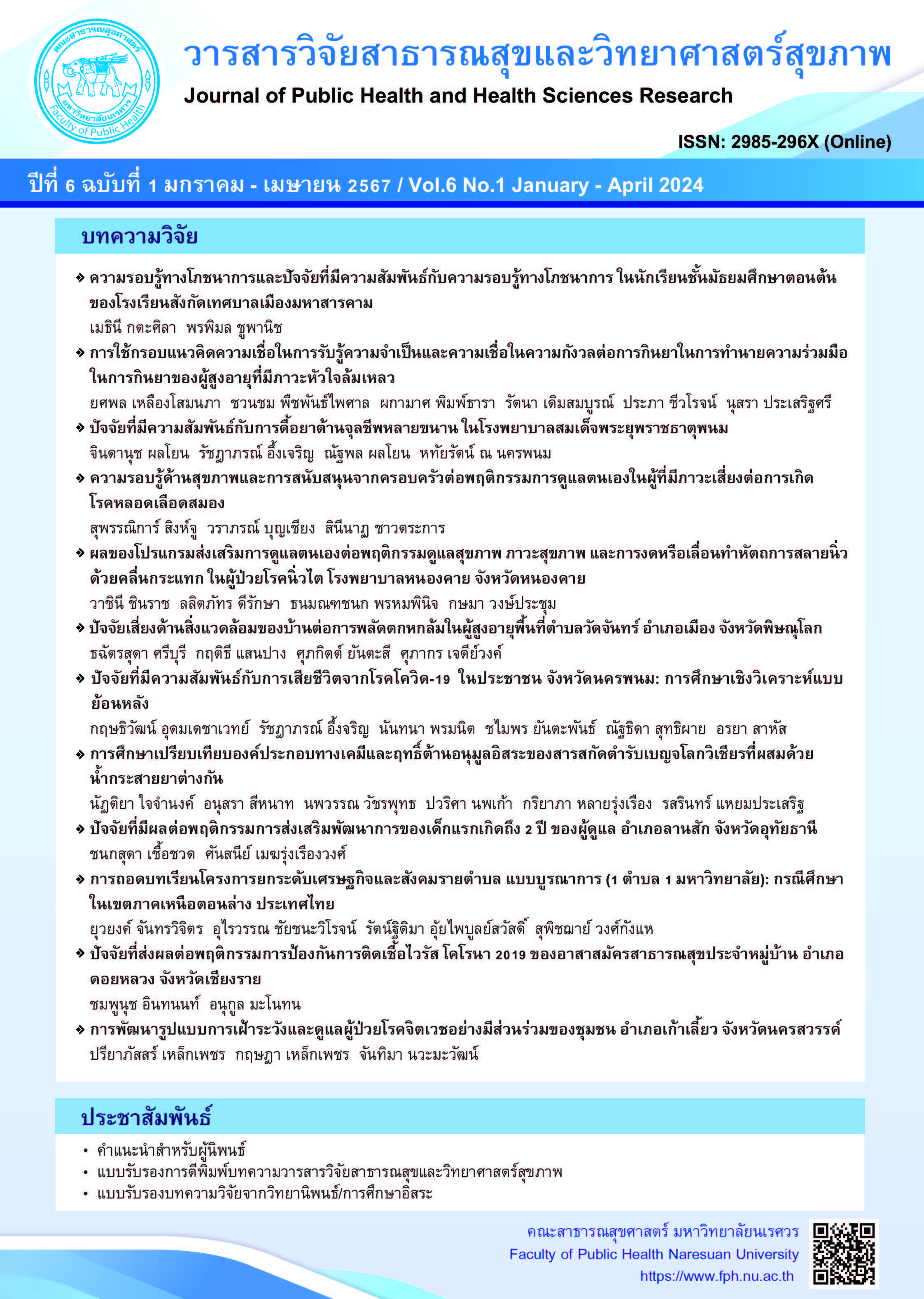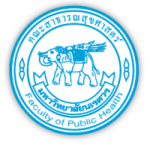Factors affecting development promoting behaviors of aged newborn to 2 years among child caregivers in Lansak District, Uthaithani Province
Keywords:
Development promoting behaviors, Newborn to 2 years, Child caregiverAbstract
This cross-sectional research aimed to assess child development promoting behavior of newborn to 2 years and investigate factors affecting child development promoting behavior of newborn to 2 years of child caregivers (CCGs) in Lansak District, Uthai Thani Province. The sample size was 420 of CCGs that were randomly by systematic random sampling. Data were collected by the validated and reliable questionnaire. Data were analyzed by using descriptive statistics and stepwise multiple regression at a significance level of 0.05
The results revealed that the sample had a high level of child development promotion behavior of newborn to 2 years (Mean = 2.43, S.D. = 0.50). Factors influencing the promotion of child development behaviors among caregivers of newborns to 2-year-olds include engaging in playtime with children, knowledge about child development promotion, being at a junior high school education level, perceiving benefits in promoting child development, marital status, access to healthcare services, and years of childcare experience. These factors collectively account for 13.2% (R2 = 0.148) of the predicting developmental promotion behaviors from birth to 2 years old among caregivers. The study recommends that public health sectors and other organizations should provide training to enhance knowledge related to promoting child development, design activities aimed at fostering perceived benefits of promoting child development and encourage playtime for children, particularly among caregivers with a junior high school education or higher. Furthermore, healthcare authorities should improve accessibility to health services to encourage caregivers to engage in appropriate child development practices for children aged 0-2 years old.
References
Best, J. W. (1977). Research in education. (3rd ed.). Engle Clift, NJ: Prentice-Hall.
Bloom, B. S. (1975). Taxonomy of education. New York: Avid McKay Company.
Busarathid, K., Prasomsuk, S., & Busarathid, J. (2021). Role of nurses in Sub-District Health Promotion Hospital for early childhood development promotion. Christian University Journal, 27(2), 120-131. (in Thai)
Chaikongkiat, P. (2018). Factors related to suspected delayed development of early childhood. Princess of Naradhiwas University Journal of Humanities and Social Sciences, 5(2), 161-171. (in Thai)
Chinpitakwattana, K., & Kulapichitr, U. (2015). Need assessment of caregivers’ educaringinfants and toddlers in childcare center. An Online Journal of Education, 10(1), 30-43. (in Thai)
Department of Health. (2017). Annual report 2017. Bangkok: National Institute of Child Health Development. (in Thai)
Department of Health. (2018). Guidelines for driving the first 1,000 days of life. Bangkok: Bureau of Nutrition, Department of Health, Ministry of Public Health. (in Thai)
Gladstone, M., Phuka, J., Mirdamadi, S., Chidzalo, K., Chitimbe, F., Koenraads et al. (2018). The care, stimulation and nutrition of children from 0-2 in Malawi—Perspectives from caregivers;” Who’s holding the baby?”. PLoS One, 13(6), e0199757.
Hair, J. J. F., Black, W. C., Babin, B. J., Anderson, R. E., & Tatham, R. L. (2006). Multivariate data analysis. (6th ed.). Upper Saddle River, NJ: Pearson Education.
Kue-iad, N., Chaimay, B., & Woradet, S. (2018). Early childhood development among Thai children aged under 5 years: A literature review. The Southern College Network Journal of Nursing and Public Health, 5(1), 281-296. (in Thai)
Ministry of Public Health. (2017). Maternal and child health standards reporting group. Social Risk Screening Results. Child Development. Retrieved on May 5, 2019, from https://hdcservice.moph.go.th/hdc.
Ministry of Public Health. (2019).Development assessment for intervention manual (DAIM). Bangkok: Office of the war veterans organization of Thailand.
Mindell, J., & Owens, J. (2009). A clinical guide to pediatric sleep: Diagnosis and management of sleep problems.(3rd ed.). Philadelphia: Wolters Kluwer.
National Institute of Child Health. (2018). Parenting guidelines promote development and learning of children under 3 years old. Nonthaburi; C G TOOLS. (in Thai)
Pender, N.J., Murdaugh, C. L., & Parsons, M. A. (2011). Health promotion in nursing practice.(6th ed.). New Jersey: Prentice-Hall.
Pitipat, A., Bhokkhaphabhubeth, S., Khamsripon, C., & Reungworaboon, S. (2018). Factors related to behaviors promoting toddler’s growth and development of toddler caregivers. Journal of Boromarajonani College of Nursing, Bangkok, 34(3), 1-10. (inThai)
Poramat, K., Intaraprasong, P., Sattayasomboon, Y., & Silabutr, J. (2017). Factors related to the effectiveness of developmental surveillance and promotion of children from birth to 5 years in a Tambon Health Promoting Hospital of Public Health Service Provider Region 5. Journal of Public Health, 47(3), 301-314. (in Thai)
Russell, C. G., Haszard, J. J., Taylor, R. W., Heath, A. L. M., Taylor, B., & Campbell, K. J. (2018). Parental feeding practices associated with children’s eating and weight: What are parents of toddlers and preschool children doing?. Appetite, 128, 120-128.
Saengkaew, R., Poogpan, J., Kamenkan, K., & Maspromrat, W. (2021). Factors predicting behaviors of caregivers in promoting early childhood development. Thai Red Cross Nursing Journal, 14(2), 152-164. (in Thai)
Saengprom, N., & Chinsomphon, S. (2015). Factors affecting the child-bearing behavior of mothers in received the services at Pediatric Department of Fort Suranari Hospital in Nakron Ratchasima Province. National Academic Conference and Research Presentation create and develop to progress towards the 2nd ASEAN Community. (page 52-58). Nakron Ratchasima: Nakhon Ratchasima College. (in Thai)
Sukkumnerd, S. (2018). Research and development of surveillance and promotion child development system by community participation. Primary Health Care Division Journal, 12(4),16-27. (in Thai)
Thawitha, L., Klunklin, P., & Urharmnuay, M. (2016). Preterm infant development promoting behaviors among primary caregivers and related factors. Nursing Journal, 43(4), 12-22. (in Thai)
Thisara, P., Ponmark, J., Seekhao, P., & Sinlapawitthayathon, B. (2017). Predictive factors of parental behaviors on promoting early childhood development in Phayao Province. Journal of Nursing and Health Care, 35(2), 169-176. (in Thai)
Tipmanosing, D. (2022). Factors affecting early childhood development of children at the Bangkok Child Development Centers. Journal of Charoenkrung Pracharak Hospital, 18(1), 51-68. (in Thai)
UNICEF of Thailand. (2016). The main mission of UNICEF. Early childhood development. Retrieved Dec 4, 2018. from https://www.unicef.org/thailand/thMinistry of Public Health.
Vanichbuncha, K., & Vanichbuncha, T. (2015). Using SPSS for Windows for data analysis. (27th ed.). Bangkok: Samlada. (in Thai)
Waedlom, W.,Chaimongkol, N., & Teerarungsikul, N. (2010). Influencing of spouse support and family functioning on sensitivity of adolescent mothers’ response to infant cues. Journal of Nursing and Education, 3(2), 44-56. (in Thai)
Downloads
Published
How to Cite
Issue
Section
License
Copyright (c) 2024 Journal of Public Health and Health Sciences Research

This work is licensed under a Creative Commons Attribution-NonCommercial-NoDerivatives 4.0 International License.
The published article is copyrighted by the Journal of Public Health and Health Sciences Research.
The statements that appear in each article in this academic and research journal are the personal opinions of each author and are not related to Naresuan University and other faculty members in the university. Responsibilities regarding each article are the responsibility of each author.






